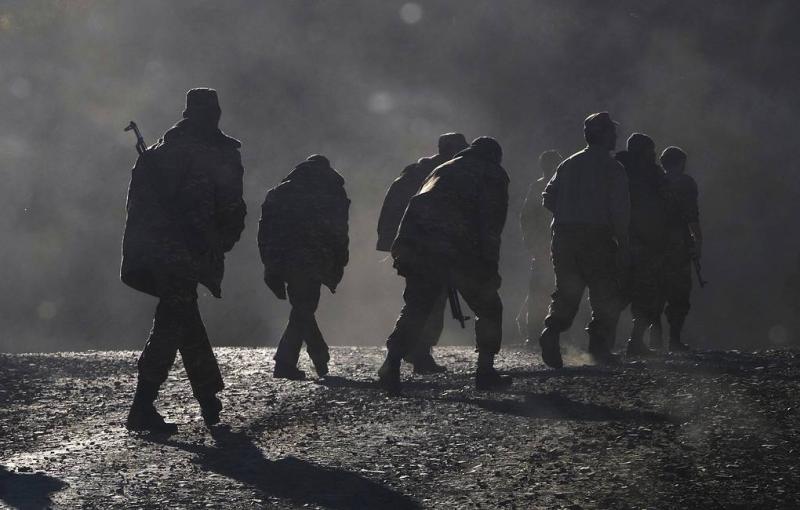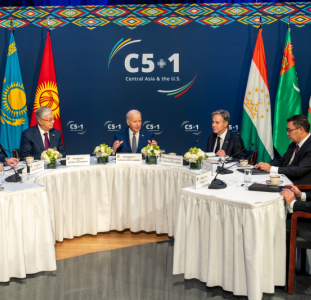
© AP Photo/TASS
Top stories from the Russian press on Wednesday, September 14th, prepared by TASS
Media: What will end tensions on Armenia-Azerbaijan border?
Yerevan views Azerbaijan’s shelling of its territory as a violation of a trilateral treaty and urges the Collective Security Treaty Organization (CSTO) and Russia to interfere, the Armenian Foreign Ministry’s Ambassador-at-Large Edmon Marukyan told Izvestia. Baku, in turn, stressed that its military operation had come in response to "the actions of Armenian saboteurs." Experts point out that it is the biggest escalation on the border since 2020 and it won’t be easy to quickly end tensions because the reasons behind the conflict are still there with the parties being unable to delimit the border and Baku claiming that Yerevan has failed to withdraw troops from Nagorno-Karabakh.
According to Armenian political scientist Grant Mikaelyan, one of the reasons for Azerbaijan’s attack was the fact that Russian forces are engaged in Ukraine. Azerbaijan-based political commentator Nijat Hajiyev specified that the tensions were the result of "Armenia’s attempts to artificially delay the peace process."
Azerbaijani political analyst Shahin Rzayev offered three explanations for the current developments when talking to Nezavisimaya Gazeta. "Armenian forces might have staged a provocation on the border with a bid to involve the CSTO in the conflict and make sure that Russian ‘peacekeepers’ are later deployed along the entire Armenian-Azerbaijani border. A second possibility is that [Armenian Prime Minister] Nikol Pashinyan might have promised something to [Azerbaijani President] Ilham Aliyev at a meeting in Brussels on August 31 but changed his mind after meeting with [Russian President] Vladimir Putin. Third, the current events may be part of an agreed plan aimed at preparing Armenian society for the signing of a peace treaty with Azerbaijan," Rzayev noted.
Armenian expert Johnny Melikyan believes that Baku, unhappy with the lack of progress in efforts to unblock transport ties on its terms, has chosen the path of conflict amid a standoff between the West and Russia. "Azerbaijan’s creeping occupation, which was not duly taken into account and condemned between March and May 2021, as well as Russia’s focus on Ukraine, provided Baku with an opportunity to use force to get what it has been failing to get at the negotiating table," Melikyan said.
Nezavisimaya Gazeta: How Russia’s post-Soviet developments affect China’s bid to return Taiwan
A meeting between Presidents Vladimir Putin of Russia and Xi Jinping of China on the sidelines of a Shanghai Cooperation Organization (SCO) summit is going to be held amid a confrontation between Moscow and the West over Ukraine, the Taiwan crisis and global economic shocks, Nezavisimaya Gazeta writes.
Xi Jinping will make his first foreign trip after the start of the coronavirus pandemic, visiting Kazakhstan and Uzbekistan, where he is expected to have a conversation with Putin. The South China Morning Post newspaper focused on military cooperation between China and Russia, who had held joint drills in the Sea of Japan during the Vostok 2022 exercises.
"After the collapse of the Soviet Union, China clearly saw the problems that the new Russia faced but it never became the reason for public gloating," Deputy Director of the Russian Academy of Sciences’ Institute of World Economy and International Relations Alexander Lomanov noted. "China needs to learn from the experience offered by the collapse of the Communist Party of the Soviet Union and the difficulties that Russia had to overcome in building a democratic state. In my view, the latest developments in terms of military activities in Ukraine will also become a very serious lesson for Beijing. The first lesson of the year was that the country needs to be prepared for painful comprehensive sanctions in case of a military operation in Taiwan. China has seen by way of Russia’s example what difficulties there may be in trade and access to technologies," the expert explained.
According to him, China has also realized that in the event of a war over Taiwan, the United States will have a strong presence in the region. "The US and the West will provide intelligence to Taiwan, send advisors, advanced weapons and mercenaries there. China’s attitude to Russian will not change. But what will change and what is already changing is China’s understanding of its military and strategic capabilities," Lomanov emphasized.
Rossiyskaya Gazeta: Iran nuke deal again on the verge of collapse
It was widely anticipated just a couple of weeks ago that talks on the Iran nuke deal would be completed soon but now, they are once again on the brink of collapse. US Secretary of State Antony Blinken stated that a deal looked unlikely in the short term. Representatives of the United Kingdom, Germany and France also made skeptical statements about the prospects for restoring the Joint Comprehensive Plan of Action (JCPOA), Rossiyskaya Gazeta writes.
Senior Research Fellow at the Russian Academy of Sciences’ Institute of Oriental Studies Vladimir Sazhin believes that the situation around the resumption of the Joint Comprehensive Plan of Action deteriorated "literally over a few days." "The main negotiators, Iran and the US, have been unable to agree on the last provisions of an agreement on restoring the JCPOA. The matter is that the US is going to hold its congressional elections on November 8. The Biden administration clearly has issues making specific decisions on Iran at the moment. Meanwhile, Iran has a well established infrastructure and serious work is underway so the country’s nuclear potential is growing with every passing day. That said, Iran will have more cards up its sleeve as time goes by," the expert pointed out.
According to Sazhin, "a decision to restore the JCPOA won’t be made before November." "And it’s hard to say what will happen after November. What will happen if the talks fatally fail? First of all, Israel and the US won’t let Iran create nuclear weapons in any case. Iran has additional resources to continue developing its nuclear program so methods of force may be used against the country. However, I totally rule out the option of a US ground operation such as the invasion in Iraq," Sazhin stressed.
"A continuation of the negotiation process is quite a possible scenario, which can go on forever. Let us recall the background of the 2015 nuclear deal: the talks had lasted for 12 years. That said, new rounds of negotiations may begin in November," the analyst noted.
Izvestia: Russia may redirect gas supplies from EU in three years
Russia can redirect gas supplies from Europe to other countries in three to five years in case the European Union establishes price caps, industry workers and experts told Izvestia. Moscow is already in talks on expanding cooperation with China, India and other countries, Federation Council members say.
As European politicians keep touting their search for alternatives to Russian gas supplies, Russian gas producers are actively holding talks and boosting cooperation with alternative commodity buyers. New prospects in China, Pakistan and India will make it possible to expand the geographic scope of gas supplies and reduce Russia’s dependence on European clients who take ambiguous actions, abandon deals and make claims with respect to prices, First Deputy Chairman of the Federation Council Committee on Economic Policy Yury Fyodorov pointed out.
In order to offset shortfalls in European supplies, Russia needs to ensure the construction of liquefied gas terminals and a tanker fleet in the Far East, which will enable the country to enter Asian markets, and build a gas pipeline through Afghanistan and Pakistan to India, said Dmitry Gusev, Deputy Chairman of the Reliable Partner association that brings together energy producers and sellers.
As for the prospects for energy supplies to China, Russia exported about 10.5 bln cubic meters of gas to the country last year and the amount is expected to approximately double in 2022, Freedom Finance Global analyst Vladimir Chernov noted. He added, citing Gazprom’s data, that gas exports to Turkey had grown by 63% to 26.76 bln cubic meters in 2022, which means that some ten bln additional cubic meters of gas will be provided to the country this year. "Given that Russia increased gas exports by 20 billion cubic meters to these two countries alone over the year, it may redirect all of its export flows in three to four years at the current pace, provided that there aren’t any more restrictions for buyers," the analyst stressed.
Vedomosti: Greenhouse gas emissions surge in wake of sanctions against Russia
Changes in logistics chains due to the sanctions imposed on Russia in 2022 have led to a surge in greenhouse gas emissions from cargo deliveries, Vedomosti writes, citing research by analysts from the Skolkovo School of Management.
The move by countries to close their air space has lengthened the routes between Europe and the northern part of the Asia-Pacific region, including Japan, South Korea and China, as well as between the United States and India. "The extension of routes reduces the amount of cargo on a flight," which additionally increases the carbon footprint of air cargo transportation, the research says. Restrictions on the maritime transportation of oil, petroleum products, grain, LNG and other Russian goods have resulted in delays and disruptions in trade flows, increasing fuel consumption and the carbon footprint of products.
"The environmental agenda and decarbonization have faded into the background for at least a couple of years under the current geopolitical circumstances," Infoline Analytics Director General Mikhail Burmistrov emphasized. A spokesperson for the Delo Group of Companies confirmed that even though sanctions had not significantly reduced environmental requirements in terms of logistics, they had peripheralized the agenda.
In the meantime, Russia is capable of ensuring the decarbonization of the transport sector on its own given the new reality, Institute for Natural Monopolies Research (IPEM) Deputy Director General Alexander Grigoryev noted. Head of the Laboratory for Low Carbon and Circular Economy at the Skolkovo School of Management Center for Sustainable Development Nikita Dobroslavsky points out that Russia’s railway sector "has huge potential as a decarbonization tool" given the country’s geographical position between the East and the West.









